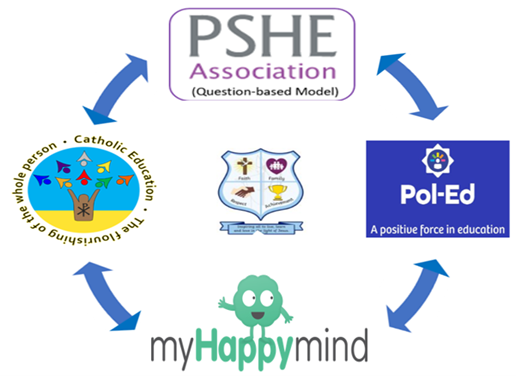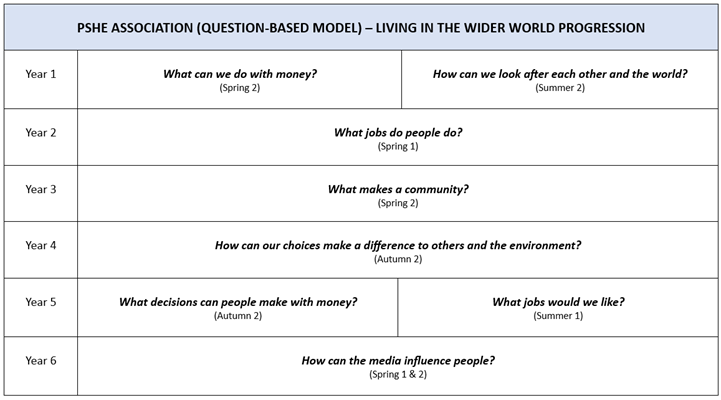St PaulinusCatholic Primary Academy
Inspiring all to live, learn and love in the light of Jesus
We are proud to work with all the Catholic schools across our two local authority areas, particularly as the Trust grows and benefits from the expertise and knowledge that other schools joining in the future will bring.
Visit UsLook at the amazing things going on in RPSHE at St Paulinus
Curriculum Intent:
How do we intend to achieve our curriculum vision in RPSHE lessons?
Combining the two elements of Relationships education and Personal, Social, Health and Economic education (RPSHE), St Paulinus aims to develop the whole child. We hope to equip our children with a sound understanding of risk and with the knowledge and skills necessary to make safe and informed decisions, tailoring our lessons to the needs of our children and their local community. With ever growing pressures on young people, we nurture children’s emotional development and give children space to ask questions in a safe and supportive environment. We will promote the spiritual, moral, social, cultural, mental, and physical development of children and prepare them for the opportunities, responsibilities, and experiences of later life.
RPSHE is a school subject taught each week in every classroom, from Nursery to Year 6, in which all pupils develop the knowledge, skills and attributes they need to manage their lives, now and in the future both at school and life outside in Modern-day Britain. It helps children and young people to stay healthy and safe while preparing them to make the most of life and work. RPSHE education also helps pupils to achieve both their academic potential and maximise their character strengths.
We use a variety of teaching and learning styles in our RPSHE lessons including whole-class teaching, group discussions, role-play, workshops, and assemblies. The majority of the curriculum will be taught through discrete RPSHE lessons and Circle Time activities and teachers are encouraged to make connections between other curriculum subjects.
Our RPSHE teaching and learning is taken from the following sources:

Curriculum Implementation:
What does RPSHE teaching look like?

We use the PSHE Association ‘Question-based Model’. This programme builder is structured around an overarching question for each term or half term. These begin in Key stage 1 as ‘What? and ‘Who?’’ questions and build throughout Key Stage 2 into ‘Why?’ and ‘How?’ questions.
This Programme of Study for key stages 1 and 2 is based on three core themes
CORE THEME 1: HEALTH AND WELLBEING
CORE THEME 2: RELATIONSHIPS
CORE THEME 3: LIVING IN THE WIDER WORLD

During key stages 1 and 2, RPSHE education offers both explicit and implicit learning opportunities and experiences which reflect pupils’ increasing independence and physical and social awareness, as they move through the primary phase. It builds on the skills that pupils started to acquire during the Early Years Foundation stage (EYFS) to develop effective relationships, assume greater personal responsibility and manage personal safety, including online.
RPSHE education helps pupils to manage the physical and emotional changes at puberty, introduces them to a wider world and enables them to make an active contribution to their communities.
Within each theme, age-appropriate topics are taught to each of the different year groups. The topics are planned so that they build on prior learning in a progressive and sequenced way logically from entry to Year 6 (see progression overviews below). Children of all abilities have the opportunity to develop their skills and knowledge in each unit and, through planned progression (outlined in RPSHE Progression Document) built into the scheme of work, we offer them an increasing challenge as they move up the school. RPSHE is a learning journey our pupils are on from the moment they start our school till they leave St Paulinus and beyond into their teenage years, then adulthood.
Example: Health and Wellbeing through school

Example: Relationships learning through school

Example: Living in the Wider World

Additional schemes and programmes we use to supplement RPSHE learning:

Pol-Ed is a West Yorkshire Police education programme, written by teachers for teachers in schools across West Yorkshire. Its purpose is to keep children safe by developing their understanding of risks, consequences and the law and to develop their resilience and ability to help and support each other. Covering age-appropriate interactions with people and situations a child may come encounter both in and out of school with lessons on relationships, keeping safe and understanding the law.
Police Officers and our local PCSO regularly visit the school to deliver assemblies and workshops on issues relating to our local community.


The ‘My Happy Mind’ programme is fully embedded throughout school our school from Nursery to Year 6. A scheme designed to prepare today’s children for tomorrow’s world by building resilient, balanced and happy minds at school and home. Based on the latest research, science and technology, we help children to develop lifelong habits and learnt to thrive. Every single child in school is taught their age-appropriate curriculum equipping all children with the knowledge and skills and tools to thrive in the modern world. My Happy Mind is taught across five modules, and each introduces a new set of content and habits to help children build resilience, self-esteem and confidence:
How many hours of RPSHE should be taught per week?
PSHE education will be one hour per week of discrete PSHE education in key stages 1 and 2, as part of a whole school, approach with opportunities to enhance the learning through other subjects and events (linked to School Virtues and British Values).
The advantages of this are:
In addition, RPSHE learning will also include a weekly 30 minute ‘My Happy Mind’ session each Monday focusing on Mental Health and Wellbeing again from Nursery to Year 6. These lessons always take place at the start of the week so that the key elements learnt can then be fully embedded throughout the course of the week.
RPSHE Theme days/weeks:
World Mental Health Day (October)
‘World Mental Health Day’ is part of our continued commitment to promoting a positive mental health for everyone, each class did several Mental Health activities. Each year, the Kirklees Keep in Mind team come into school to deliver assemblies and workshops on how to maintain a positive mental health. For further details: https://www.mentalhealth.org.uk/our-work/public-engagement/world-mental-health-day

Anti-Bullying Week (November)
At the start of the week, Kirklees Keep in Mind (who help children and young people improve their mental health and emotional wellbeing) came into school to deliver assemblies to both KS1 and KS2 on ‘Anxiety’. They then held further workshops for some of our pupils. We work very closely with KKIM throughout the year on a range of themes offering advice support, and strategies for children through challenging times such as exams and transition to high school.

Then in our weekly RPSHE lessons, we had an ‘Anti-bullying’ lesson using this year’s theme of ‘Choose Respect’. The aim is to empower children and young people to not resort to bullying, even when we disagree and remind adults to lead by example, online and offline. The children learnt clear definitions of what ‘bullying’ and ‘respect’ are and strategies on how to deal with disagreements in a calm and responsible way so that it does not lead to conflict. For further details on anti-bullying: https://anti-bullyingalliance.org.uk/anti-bullying-week-2024-choose-respect/anti-bullying-week-2024-choose-respect



Children’s Mental Health Week (February)
The theme of this year’s Children’s Mental Health Week is Express Yourself (in school and part of Home Learning).
Expressing yourself is about finding ways to share feelings, thoughts, or ideas, through creativity. This could be through art, music, writing and poetry, dance and drama, photography and film, and doing activities that make you feel good.



To find out more about Children’s Mental Health Week for 2025: https://www.childrensmentalhealthweek.org.uk/
Time to Talk Day (February)
Time to Talk Day is an annual awareness day held at the beginning of February. It’s a day for us all to start a conversation about mental health. Talking about mental health isn't easy. But a conversation has the power to change lives. This year’s theme was



Time to Talk Day is run by Mind and Rethink Mental Illness, in partnership with the Co-op. For further details: https://timetotalkday.co.uk/
Kirklees Keep in Mind

Kirklees Keep in Mind helps children and young people improve their mental health and emotional wellbeing. This might be directly with young people and or their parents/carers. Sometimes this work may be 1-1 and sometimes in a group. They work very closely with schools and support us on a number of themes and issues throughout the school year delivering assemblies or workshops to offer advice and strategies for challenging times such as exams and transition to high school. There are also lots of resources and links on their website for you to use.


To view their website: https://kirklees-keep-in-mind.nhs.uk/
Curriculum impact:
What do our outcomes in PHSE look like? How successful is our PHSE teaching?
Assessment:
It is important for pupils to have opportunities to reflect on their learning, especially when that learning relates directly to the individual’s identity – their personal qualities, attitudes, skills, attributes, achievements and influences.
Personal attributes, so central to PSHE education, are arguably the hardest aspects of learning to assess. It is difficult for teachers to accurately assess a pupil’s self-confidence or sense of their own identity and values. However, pupils themselves will be able to judge, for instance, whether they feel more confident, or have a firmer sense of their own beliefs and opinions than they did before a particular series of lessons.
Such personal reflection in PSHE education lessons is essential, so ensuring pupils have time and space within the lessons to reflect on this, either privately or through discussion, is a vital part of the assessment process. Assessing learning in PSHE education must therefore use a combination of teacher assessment and pupil self- and peer assessment.
Activities used to measure progress:
Comments from our most recent pupil voice…